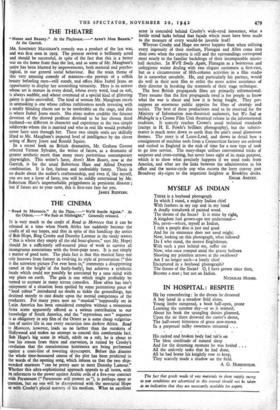THE CINEMA
" Road to Morocco." At the Plaza.—" We'll Smile Again." At the Odeon.—" We Sail at Midnight." Generally released.
Ir is very much to the credit of. Road to Morocco that it can be released at a time when North Africa has suddenly become the cradle of all our hopes, and that in spite of this handicap the antics of Bob Hope, Bing Crosby and Dorothy Lamour in the sandy wastes (" this is where they empty all the old hour-glasses," says Mr. Hope) should be a sufficiently self-assured piece of work to survive all incongruous associations with the front-page news. It is not simply a matter of good taste. The plain fact is that this musical farce not only borrows from fantasy in evolving its style of presentation (" this is the screwiest picture I've ever been in," comments a disapproving camel at the height-of the hurly-burly), but achieves a synthetic locale which could not possibly be associated by a sane mind with any place on .earth. The gain is one which might profitably be turned to account in many screen comedies. How often has one's enjoyment of a situation been spoiled by some pretentious piece of "local colour " introduced no doubt to tickle the groundlings, but destined merely to cast doubt upon the mental competence of the producers. For many years now no " musical " 'supposedly set in Latin America has been considered complete without a monstrous fiesta scene apparently offered as a serious contribution to our knowledge of South America, and the "mysterious east " sequence is as obligatory in any film of the Orient as is some cheap vulgarisa- tion of native life in our every excursion into darkest Africa. Road to Morocco, however, leads us no farther than the outskirts of Hollywood and makes no attempt to conceal this comfortable fact. Bob Hope's big scene in which, adrift on a raft, he is about to lose his reason from thirst and starvation, is ruined by Crosby's revelation that the conscientious histrionics are being performed against a coast-line of towering skyscrapers. Before this disaster the whole time-honoured course of the plot has been predicted in the words of the opening song, which inform us that the two ship- wrecked mariners " can be pretty sure to meet Dorothy Lamour." Whether this ultra-sophisticated approach appeals to all tastes, with its references to the power against Arabic evils of a five-year contract with Paramount (" Paramount will protect us "), is perhaps open- to question, but no one will be disappointed with the mercurial Hope or with Crosby's placid mastery of his medium. What an excellent actor is concealed behind Crosby's wide-eyed innocence, what a fertile mind lurks behind that facade which must have been made to the measure of every would-be juvenile lead! Whereas Crosby and Hope are never happier than when utilising every ingenuity of their medium, Flanagan and Allen come into their own when the camera is still and the surroundings correspond most nearly to the familiar backdrops of their incomparable music- hall sketches. In We'll Smile Again, Flanagan as a boisterous and unhygienic waiter dealing with two elegant customers is first-rate, but as a circumventor of fifth-column activities in a film studio he is somewhat unsubtle. He, and particularly his partner, would do well in their next film to enlist the more active assistance of their director in breaking the trammels of their stage technique.
The best British propaganda films are primarily informational. They assume that the first propaganda need is for people to know what the war is about and how it is being fought. They pre- suppose an enormous public appetite for films of strategy and tactics. The best of these productions tend to be reserved for the Ministry of Information non-theatrical audiences, but We Sail at Midnight is a Crown Film Unit theatrical release in the informational tradition. It scarcely reaches Crown's usual technical standards (except in H. E. Fowle's brilliant photography), but the subject- matter is much more down to earth than the unit's usual glamorous themes. The story is of Lease-Lend, and shows in detail how a consignment of machine tools from a Connecticut factory are ordered and rushed to England in the nick of time for a new type of tank to go into service. The story-shape utilises conventional tricks of suspense and cross-cutting, but never loses sight of its main purpose, which is to show what precisely happens if we need tools from America, and what are the links between the administrator in his office and the motor-cycle cop who escorts the lorry convoy past Broadway sky-signs to the impatient freighter at Brooklyn docks.
EDGAR ANSTEY.


























 Previous page
Previous page